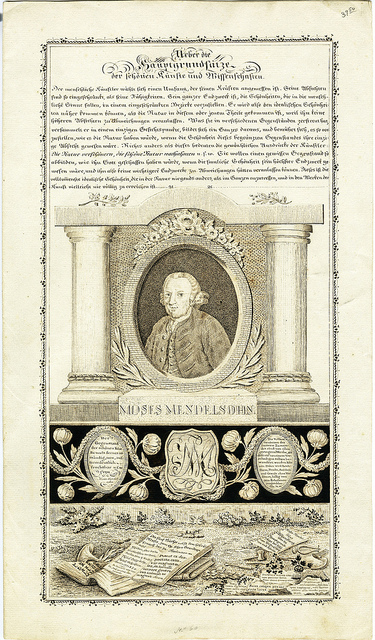
On the Main Principles of the Fine Arts and Sciences: Portrait and tribute to Moses Mendelssohn (Germany, 1781-1782)
Über die Haupgrundsätze der schönen Künste un Wissenschaften (On the Main Principles of the Fine Arts and Sciences)
Germany, [1781-82]
Engraving
Gift of William P. Wreden
75.2, The Magnes Collection of Jewish Art and Life
Engraved portrait of and allegorical tribute to German-Jewish philosopher Moses Mendelssohn (1729-1786), titled after his essay, On the Main Principles of the Fine Arts and Sciences, originally published in 1757 as Betrachtungen über die Quellen un die Verbindungen der schönen Künste und Wissenschaften and reissued as Über die Haupgrundsätze der schönen Künste und Wissenschaften in the second volume of his Philosophische Schriften (Berlin, C. F. Voss, 1771: 95-152).
The portrait is surrounded by German excerpts from Mendelssohn’s essay, allegorical images of the Arts (laurel, art tools and musical instruments, referring to poetry, painting, sculpture and music), images of open books that include the Bible in Hebrew (with mirrored Hebrew script, caused by a printing error) and German, Mendelssohn’s Philosophical Writings (vol. 2, 1771) and Phädon (1767), and banderoles with Latin quotations from various authors, including Seneca.
Key to the Textual quotations in German, Latin and Hebrew
A. Top of page, below the title:
Der menschliche Künstler wählt sich einen […] [Paraphrase of “Über die Haupgrundsätze…,” in Philosophische Schriften, vol. 2, Berlin, C. F. Voss, 1771: 115]
B. Medallions under portrait: Two quotations from M. Mendelssohn:
1. Der Gegenstand der schönen Künste muss ferner anständig, neu, ausserorderlich, fruchtbar u.f.w. seyn. Moses Mendelssohn
2. Die Volkommenheiten des äussern Zustandes sind von allzugeringerm Werthe, als däst sie vonemen Verst; andingen sollen bewundert werden könen. […] M.M.
C. Bottom open books and balloons:
1. [Bereshit bara el…] [Genesis, 1:1 in mirrored Hebrew squared script]
2. Die fünf Bücher Mosis, zum gebrauch der jüdisch [deutschen Nation] dem hebraischen Grundtext, Berlin [and Stettin, Nicolai], 1780-81
3. Phädon, oder über die Unsterblichkeit der Seele, Berlin 1776… Philosop. Gespräche [Berlin 1755]. Philosop. Schriften Berlin 1771, II, I, 8 [by M. Mendelssohn]
4. In lectione non verba, sed veritas est amanda [originally in Isidorus Hispalensis, Sententiae, Cl. 1199, lib. 3, cap. 13, sent. 8; p. 237, linea 39]
5. Potest ex despectata casa vir magnus exire, ex humili corpore generosus animus ac magnus. [sic] Seneca [cf. Seneca, Epistulae morales ad Lucilium, epist. 66, par. 3, p. 210: Potest ex casa vir magnus exire, potest et ex deformi humili que corpusculo formosus animus ac magnus.]
6. Moses Mendelssohns, Abhandlung über die Hauptgrundsätze der schönen Wissenschaften und Künste [sic], [in Philosophische Schriften, Berlin, 1771]
7. Aliis prosit exemplum
8. Sunt cuncta ubique famula diligentia
9. Statuam figura, virum actio exornat
10. Doctrina mores esse non patitur feros. Evasi doctus spectans aliena mala [Menander, Monosticha 41; Erasmus/Manutius, Adagia 41]
11. Suus cuique pro meritis locus
12. Omnes expetimus utilitatem, ad eam que rapimur, nec facere aliter ullo modo possumus [Cicero – De officiis, 3, 28, par. 101, p. 116, linea 26]
Anonymous
Collection #75.2
Publication DateSeptember 7, 1781
Place of Creation/PublicationGermany
Countrygermany
Keep Up-To-Date
